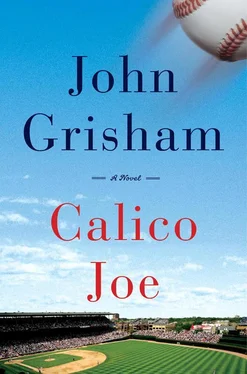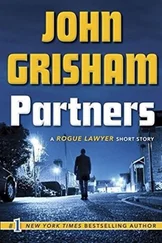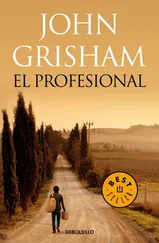* * *
The sandwich is gone. I gather my scrapbook, pay the check, and continue my journey. Before long, I leave the rice and bean fields and enter hill country, then the Ozark Mountains, which are not really mountains but more like slightly larger hills. At Batesville, birthplace of Rick Monday, I cross the White River and follow it north, through Mountain View and into the Ozark National Forest. It is a beautiful drive along Highway 5, a narrow winding road that is probably worthy of a postcard in October, but it is August and the grass is brown.
As far as I could tell, Joe Castle still lives in Calico Rock. After his brief career ended, he returned home and dropped out of sight. There had been stories about him, but with time, and with virtually no access, the journalists and reporters had forgotten about him. One of the last efforts had been a visit by a writer for Sports Illustrated in 1977, but the town had quickly closed ranks, and almost no information was exchanged. The reporter could not find Joe and was asked to leave by his brother Red.
* * *
As I enter Calico Rock, I tell myself for the hundredth time that I am being foolish. Not only would I fail in my little mission, but there is also an element of danger.
It is a lovely village, on a bluff above the White River. Trout docks are bunched near the bridge; fishing is important along the river. I park in front of the shops on Main Street, and for a moment I wonder what it must have been like thirty years earlier when Joe’s friends and family gathered in crowds to listen to Vince Lloyd and Lou Boudreau call the games during that magical summer. I can almost feel the heartbreak when Joe went down.
I am looking for a man named Clarence Rook, the owner of the Calico Rock Record , the small weekly newspaper that has been reporting the town’s business for half a century. Mr. Rook has been with the paper for almost that long, and if he chooses not to cooperate, I really have no alternative plan. The office is on Main Street, three doors down from Evans Drug Store. I take a deep breath and walk inside. A young secretary in blue jeans greets me with a big smile and friendly hello.
“I’m looking for Mr. Clarence Rook,” I say in a well-rehearsed line.
“He’s pretty busy,” she says, still smiling. “Can I help you?”
“No, but thanks. I really need to see him.”
“Okay. Can I have a name?”
“Paul Casey. I’m a reporter with Baseball Monthly .” These lies will not last long, but the truth simply will not work right now.
“Interesting,” she says. “And what brings you to Calico Rock?”
“I’m working on a story,” I reply, well aware of how vague I sound.
“Okay,” she says, retreating. “Let me see what he’s doing.”
She disappears into the back. I can hear voices. The walls are lined with framed copies of old editions, and it doesn’t take long to find one from July 1973. The bold headline read: “Joe Castle in Stunning Debut with Cubs.” I take a step closer and begin reading. The story was written by Clarence Rook, as were most of the front-page articles, and it was filled with unabashed pride.
I have a copy of it in my scrapbook.
“Mr. Rook will see you,” she reports, nodding to a narrow hallway. “First door on the right.”
“Thanks,” I say with a smile and head for the rear.
Clarence Rook is a colorful sight—red cheeks, white shirt, red bow tie, red suspenders, probably seventy years old, with a thick gray beard and a mop of Mark Twain–style white hair. He is chewing on the stem of a pipe, one that rarely leaves his mouth, and he is behind an old wooden desk covered with stacks of assorted files and papers. To one side is a battered Royal typewriter, circa 1950, still being used.
“Mr. Casey,” he says in a high-pitched, energetic voice as he thrusts forward his right hand. “Clarence Rook.”
I shake his hand and say, “Nice to meet you, sir. Thanks for seeing me like this.”
“No problem. Have a seat.”
I sit in the only chair that is not filled with assorted debris.
“Where you from?” he asks with a smile that reveals a mouthful of tobacco-stained teeth.
“Santa Fe,” I say.
“Oh, beautiful country out there. Ms. Rook and I drove out west a few years ago, stopped in Santa Fe to see the O’Keeffe museum. Spectacular country, wouldn’t mind living there myself.”
“Yes sir, we enjoy it, but you have a pretty nice town here.”
“Indeed we do. I was born just up the road in Mountain Home; don’t guess I’ll ever leave.”
“How long have you owned the paper?” I ask in an effort to kill some time with preliminary chitchat. He seems perfectly willing to do the same.
“Bought it twenty years ago from Mrs. Meeks, who owned it forever. She hired me when I was a kid. Never thought I would spend my life publishing a paper, but I’ve loved every minute of it. So you write too?”
“No sir, I’m not a writer, not a reporter.”
The smile vanishes as his eyes narrow and he tries to digest this.
I continue, “And my name is not Paul Casey. It’s Paul Tracey.”
From a drawer he picks up a pouch of tobacco, slowly fills the bowl of his pipe, tamps it firm, then strikes a match. He never takes his eyes off me, and after he blows a small cloud of smoke, he asks, “Have you ever been told you favor Warren Tracey?”
“I’ve heard that before, yes.”
“Any relation?”
“He’s my father.”
As expected, this is not well received. For thirty years, I have often hesitated when giving my last name. Usually, it does not get a reaction, but there have been enough uncomfortable moments to render me gun-shy.
He puffs hard for a while, glaring at me, and finally says, “You could get shot around here.”
“I didn’t come here to get shot, Mr. Rook.”
“Why are you here, son?”
“My father is dying of pancreatic cancer. He’ll be gone in a few months.”
Another puff, another cloud. “I’m sorry,” he says, but only to be polite.
“I doubt if this news will cause too much anguish here in Calico Rock,” I say.
He nodded and said, “You’re right about that. Most folks in these parts would enjoy watching Warren Tracey burn at the stake. And slowly.”
“I realize that.”
“Does anyone else know you’re here?”
“No sir. Only you.”
He takes a deep breath and stares at a table lamp, trying to collect his thoughts. A clock on his wall gives him the time as 5:10. I wait, somewhat nervously. He’ll either order me out of his office or decide to chat a bit longer. I’m betting on the latter because he is, after all, a reporter and naturally curious.
“Where is your father these days?” he asks.
“Florida. He left the family when I was twelve, and we’ve had little contact over the years. We’re not close, never have been.”
“Did he send you here?”
“No sir. He doesn’t know.”
“May I ask, then, what, exactly, are you doing here?”
“I want to talk to Joe Castle, and I’m hoping that you know the family pretty well.”
“Indeed I do, and I know them well enough to tell you that Joe doesn’t talk to strangers, and he sure as hell won’t talk to the son of Warren Tracey.”
6

Sunday, July 15, 1973. Wrigley Field was once again packed with forty-one thousand fanatics. Another crowd, estimated at ten thousand, mingled outside the stadium looking for tickets, drinking beer, listening to the radio, and in general getting as close as possible to baseball history. Adding to the excitement was the fact that Juan Marichal was starting for the Giants, and his road games generally increased the gate. Though his better years were behind him, Marichal could still beat any team on any day. With his high-kicking windup, superb control, intimidating tactics, and dogged competitiveness, Marichal was colorful and always dangerous. In the previous thirteen years, he had pitched many games at Wrigley, and he had won far more than he had lost.
Читать дальше












